

Media Articles - New research study explores the Asian student experience of degree awarding gap - University of Winchester. The findings of a research project aimed at better understanding the experiences of Asian students studying at the University of Winchester show that they experience particular challenges, which are markedly different from other BAME (Black, Asian and Minority Ethnic) students.
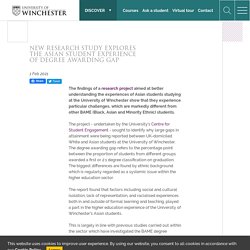
The project - undertaken by the University's Centre for Student Engagement - sought to identify why large gaps in attainment were being reported between UK-domiciled White and Asian students at the University of Winchester. The degree awarding gap refers to the percentage point between the proportion of students from different groups awarded a first or 2:1 degree classification on graduation. The biggest differences are found by ethnic background which is regularly regarded as a systemic issue within the higher education sector. Age-positive image library launched to tackle negative stereotypes of later life. We've launched the first free library showing ‘positive and realistic’ images of older people in a bid to challenge negative and stereotypical views of later life.
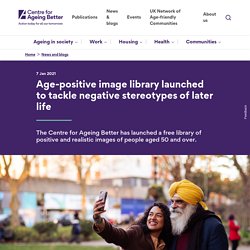
The images show a more realistic depiction of ageing and old age – to provide alternatives to the commonly used pictures of ‘wrinkly hands’ or walking sticks. The library, which contains over 400 images and will be regularly updated, offers organisations a wide selection of images that avoid stereotypes associated with older people. 191208 umhc artwork. English higher education 2020: The Office for Students annual review - Office for Students. Responding to the coronavirus pandemic The national lockdown in March had an immediate and enormous impact on higher education.

Often under immense pressure, universities and colleges found innovative ways to deliver online teaching, keep their students and staff safe, and contribute to the wider national scientific and health effort. Despite gloomy predictions in the spring, recruitment nationally has broadly held up. In response to the crisis, the OfS was quick to adapt its regulatory approach to allow providers the space to focus on supporting students. We established realistic expectations for teaching quality, standards and student protection. SAGE Journals: Your gateway to world-class journal research. 'I didn't feel I fitted in': why Gypsies, Roma and Travellers don't go to university. One day at school, Jack* was accosted by his teacher while he was putting his coat on and getting ready to leave the classroom.

“Leave it there,” she insisted in front of his classmates. “We donated you that. Your mum didn’t have enough money to buy you a coat.” When he argued back – his mum, a successful public sector employee, had bought the coat for him before term – he was given detention for a week. Digital assessment: leave no one behind. Throughout lockdown and during the summer, universities worked to ensure their online platforms were in the best possible condition in time for the new academic year.
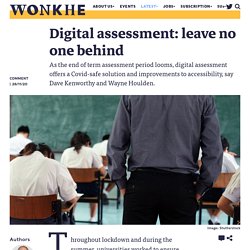
The rise in coronavirus infections across campuses since September has meant that institutions have continued to rely on remote teaching and learning solutions to deliver course material. It is highly unlikely that universities will be able to offer face-to-face invigilated exams this academic year, so it’s never been more important to provide robust, reliable alternatives to traditional assessment practices. Going digital is the next logical step in replacing outdated, cumbersome, paper-based process fraught with complications. Digital assessment is inherently more flexible at supporting accessibility than traditional methods of testing knowledge.
Twitter. Tackling differential outcomes for underrepresented students in higher education - Office for Students. Last week we published an independent evaluation of the Addressing Barriers to Student Success (ABSS) programme.
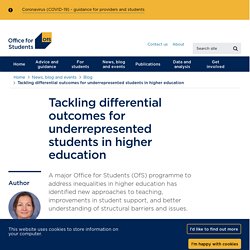
The two-year programme saw a £7.5 million investment by the OfS in 17 projects led by universities and colleges across England. The aim was to address inequalities in higher education and the structural barriers some groups of students face in achieving a good degree and going on to graduate-level employment or further study. The OfS’s strategy for access and participation involves provider-level regulation, through which we agree commitments with providers to reduce gaps in equality of opportunity across the student lifecycle, and also sector-wide support for activity that will not be conducted by providers working alone, such as collaboration and sharing of ‘what works’.
The ABSS programme delivers on the second part of our strategy. Tandfonline. Assessment and Social Justice in the Hybrid University. Tandfonline. The tyranny of chairs: why we need better design. ‘Let’s face the considerable evidence that all sitting is harmful,” writes Galen Cranz, a design historian whose book The Chair traces this object’s long history.

Not all sitting, of course. Equality, diversity and inclusion issues to consider – Melissa Highton. There is a risk that when we change things at speed some of the gains we have made previously get lost, reversed or return to ‘business as usual’.
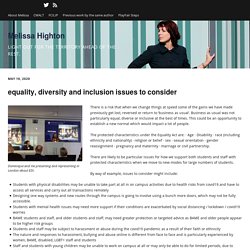
Business as usual was not particularly equal, diverse or inclusive at the best of times. This could be an opportunity to establish a new normal which would impact a lot of people. The protected characteristics under the Equality Act are: · Age · Disability · race (including ethnicity and nationality) · religion or belief · sex · sexual orientation · gender reassignment · pregnancy and maternity · marriage or civil partnership. There are likely to be particular issues for how we support both students and staff with protected characteristics when we move to new modes for large numbers of students. Inclusivity and alignment: Principles of pedagogy, task and assessment design for effective cross‐cultural online learning: Distance Education: Vol 22, No 1. Shân Wareing sur Twitter : "I am gripped by ‘White Fragility’ by Robin Diangelo which I’m reading for @MairiWatson’s @UniNorthantsFBL reading group. “The dimensions of racism benefiting whites are usually invisible to white people... eg being consistently.
Shân Wareing sur Twitter : "Thank you @Eluned_Parrott and the @theunitefdn team for this afternoon’s House of Lords event launching a report into the experiences of students who don’t have family support. It was great to meet some of the scholars whose st. Shea martin sur Twitter : "instead of “i don’t see color,” try “my friends and I have many differences, including race and/or ethnicity. i recognize my privilege and know their experiences in this society are different than mine due to systems/ structures.
6abc. Baroness Amos: First-ever black woman appointed as master of University College at Oxford. - Baroness Valerie Amos has been appointed the new master of University College at Oxford - She makes history as both the first female master of University College, Oxford, and the first black head of any Oxford college.
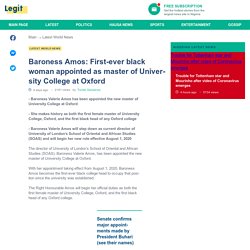
The ex-teacher trying to 'normalise' Oxford University. “Education, education, education.
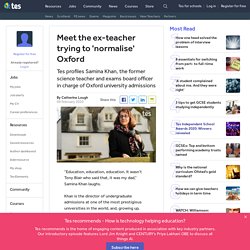
It wasn’t Tony Blair who said that, it was my dad,” Samina Khan laughs. Khan is the director of undergraduate admissions at one of the most prestigious universities in the world, and, growing up, education was always prized and valued at home. She describes how her scientist father was passionately invested in his children’s schooling from an early age. 07294360.2020. In Australia, the number of female graduates in some science, technology, engineering, and mathematics (STEM) disciplines is as low as 15%.
Previous reviews exploring the issues affecting female undergraduate STEM students are primarily based in North America and there is yet to be an Australian focused review. This review identifies the factors contributing to the gendered experience of Australian undergraduate STEM students. The Human Work of Higher Education Pedagogy. In December 2018, I coauthored a piece for the Chronicle of Higher Education with Sara Goldrick-Rab, “Teaching the Students We Have, Not the Students We Wish We Had.” We wrote about the need to adapt pedagogical approaches for the real and complexly human students who show up in our classrooms.
We ended that piece with the following sentence: “This is not a theoretical exercise—it is a practical one.” Those words were a call to action for institutions, for teachers, and also for us. The following summer, we taught a weeklong intensive course, Social Justice and the Curriculum, at Digital Pedagogy Lab, an international series of professional development events for students, teachers, librarians, and technologists. Inclusive Teaching. Dates being planned for January 2020 In order to meet the university’s legal obligations (The Equality Act 2010 and Public Sector Equality Duty) and to maintain pedagogical practices at the leading edge of the sector, the university must ensure learning, teaching and assessment practices promote inclusive curricula, eliminate discrimination, advance equality of opportunity and fostering good relations between groups who share a characteristic and those who do not.
OCSLD devised The Inclusive Practice Benchmarking Tool to support programme leaders engage their teams on benchmarking their current practices and to discuss and co-construct enhancements to programme practices to ensure all our graduates have an enhanced and accessible learning experience. Outcomes and actions from the benchmarking tool can also be documented as part of the quality processes, such as annual and periodic reviews and programme approval.
Register your interest here » Protocol. The academic conference is a key part of many academics’ working lives and careers. The goal of this Protocol is to provide support for building inclusivity into academic conferences across all disciplines, aiming to take into account a range of possible factors that might reduce inclusion. This Protocol was drafted by a group of staff at Oxford Brookes University, drawn from a range of academic disciplines and areas of student support. It considers not only issues where UK universities are under a legal obligation to have due regard to the need to eliminate discrimination, but also to other issues impacting on inclusion, such as class. Inevitably, building inclusivity in needs to be implemented in the particular context of your conference - a colloquium where all ten participants in a very narrow field are giving papers is very different from a multi-day, multi-stream, international conference where only a selection of offered papers are accepted.
This Protocol is a living document. Tensions around decolonising teaching and learning. What has been learned from 20 years of published articles on widening participation and lifelong learning? - HEPI. This blog was kindly contributed by Dr John Butcher, Associate Director at The Open University . 07294360.2018. Introduction. Ella Kahu: Opening up higher education: understanding and improving student engagement – How Researchers Changed the World. EK: I’m certainly not alone in this one, there’s plenty of research on this, that learning is transformational; that it does change people. University of Brighton Decolonising the curriculum Issue 2 December 2019 Moncrieffe et. al. Decolonising the curriculum MONCRIEFFE 32 pages 4th July. Decolonising SOAS. Moodle. Five Themes from Education Systems Around the World- Shân Wareing. Getting through the day and still having a smile on my face! How do students define success in the university learning environment?: Higher Education Research & Development: Vol 37, No 5.
Student Success: 3 Big Questions. Colleges and universities embrace the aspiration of student success yet are still grappling with big questions about how to define, measure, and structure student success, all while keeping the student at the center. Student success is firmly cemented as a priority for colleges and universities. University / Center for the Advancement of Teaching & Learning / Using Structure for Inclusive Teaching.
Using Structure for Inclusive Teaching. Taking IT Way beyond Accessibility: 5 + 4 = 1 Approach. Dr Sara Camacho Felix sur Twitter : "My first post on the Decolonising the LSE Collective's blog Read a little bit about my research with students of colour at the LSE. @decolonisingLSE @JulesCorwin @Rktkt_Jjay @gabi_cabana @Gordo. Researching Students of Colour at LSE to understand experiences of race and racism – Decolonising the LSE Collective. Coursera. Changing Mindsets - Changing Mindsets.